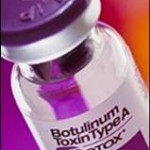
First and foremost any drug, no matter what its mechanism of action, poses the potential of diminished effectiveness with repeated use. The most classic example is that of antibiotics. (although this really represents resistance of the infecting bacteria not necessarily how the body responds to it) But immunity or developing an immune response to a toxin, an unnatural molecule that the body may eventually recognize as both foreign and harmful, is particularly likely. While I hold most responses on the internet as not a source of absolute scientific information, there is too many patient responses on many different websites that claim a lack of response after injection or a dramatic dropoff in effectiveness after a period of years of successful use. (most common) While some, if not many, of these may be the result of using overdiluted or old Botox or from poor injection technique, all of them can’t be completely drug or injector-related issues.
Resistance to serotype A of botulinum toxin (Botox and Dysport) has been reported in some physician series but the incidence is quite low. (usually less than 1%) The point is…it has been reported in professional medical journals in large patient series. Anectodal statements by some physicians such as ‘I have never seen it’ and the like does not count as scientific evidence. Never having seen it does not mean it doesn’t exist. Most of us have never seen a platypus in the wild either, but we know they do exist.
Once you develop Botox immunity, what can you do? There is no absolute answer to this uncommon problem. Perhaps waiting a period of time ( 6 months to a year?) before trying repeat Botox is one option to see if your immune response lessens. The other option is to use a different serotype, type B (Myobloc), and see if you get a response. In theory, different serotypes have slightly different molecules so your immune response may be quite specific to type A only.
Whether someone can be completely immune to Botox, without PRIOR injections, is a different matter. There would be no natural immunity to Botox since most of our immune systems have never seen the molecule before. When a first-time patient of mine calls and tells me they have had no response, actual examination everytime demonstrates that they actually have had a response it is just not as profound as they thought it to be. This is an issue of managing expectations and dosing, rather than some natural resistance to the drug.
By far, the most common patient experience in my practice with Botox is that patients actually develop a somewhat lesser need with Botox over time. After three or four treatments, many patients find that the Botox seems to ‘last longer’ and they may only need injections twice a year as opposed to every three or four months. This is not because the patient has developed greater sensitivity to the drug but because they have most likely ‘retrained’ their expressions. which are learned movements anyway. Once you have not moved or have less movement of any muscle for a long enough period of time, you may have inadvertently retrained your expressions to some degree.
Acquired Botox immunity is a real but uncommon event. It usually presents in the patient who has had Botox for multiple treatments, after a year or two, with a diminished response to a proven dose or sometimes as no response at all. Botox resistance without prior exposure is more likely an issue of expectations and proper dosing rather than a natural immunity.
Dr. Barry Eppley
Indianapolis, Indiana


